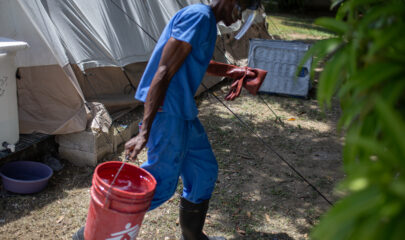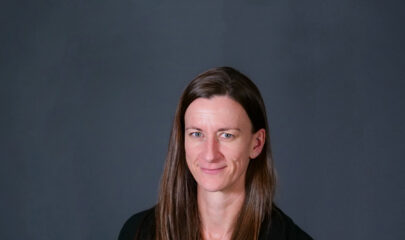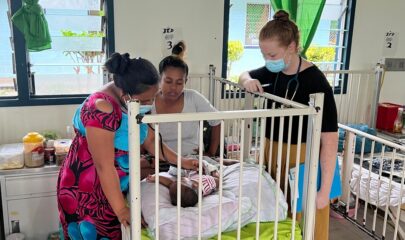For decades, parts of Haiti have expe-rienced violence, earthquakes, political instability and epidemics. This succession of disasters and events has led communi-ties into an unsustainable cycle of poverty, violence and crisis that is compromising people’s safety and health.
“The situation in Haiti reflects a complete crisis at all levels,” says Witny Dorsainvil, Doctors Without Borders/Médecins Sans Frontières (MSF) deputy head of country support in Haiti. “Violence is widespread, access to essential care and services is compromised, the needs are immense and so are the challenges.”
In many neighbourhoods, people are facing an explosion of violence and struggle to access clean water, essential food and basic healthcare.
MSF teams have been present in the country for more than 30 years, providing assistance in different locations and medical facilities.
VIOLENCE THAT DRAWS ITS STRENGTH FROM INSTABILITY
The humanitarian crisis in Haiti is complex. It is the result of the combined effects of political, institutional and environmental crises that have shaken the country. The unresolved emergencies and the poverty that people face create a fertile ground for armed groups, especially among young people in disadvantaged neighbourhoods – often becoming part of these groups seems the only option.
“There are many motivations for young people to join armed groups, but behind these motivations is the misery, the need to find a livelihood and to help family mem-bers,” says Dorsainvil.
Police authorities themselves are strug-gling to counter this escalating violence. According to the national union of Haitian police, 14 officers were killed between Jan. 10 and 25, 2023.
A WAR ON FUEL
In this context of generalized crisis, the dif-ficulties in obtaining fuel are a determining factor that paralyzes the country. Although the situation is less critical than during the 2022 blockade, it still aggravates the vio-lence and affects all the basic services that communities need.
“The government has stopped subsidiz-ing fuel, which creates scarcity and price increases that contribute to the violence,” says Dorsainvil. “The blockade of the main oil terminal in the fall of 2022 literally added fuel to the fire. The country was blocked, medical institutions were blocked, everything was blocked.”
Due to a lack of fuel to power their gen-erators, several clinics and health centres operated or supported by MSF were forced to close or reduce their services, depriving people of essential healthcare.
CRESCENDO OF CRISES COMPROMISES PEOPLE’S HEALTH
From fuel shortages, looting, difficult or impossible access to healthcare to short-age of drinking water, the crisis in Haiti is affecting people’s physical and psychologi-cal health in many ways. The resurgence in 2022 of cholera, which had not been seen since the last case was reported in Febru-ary 2019, is a testament to this.

“Blocked roads, violence and fear, fuel shortages – this widespread dysfunction translates into a lack of access to clean water, among other things. It’s hard not to make the connection to the cholera epidemic, but it can also be the combined result of all the services and care that communities don’t have access to,” says Dorsainvil.

© MSF/Alexandre Marcou
People are also facing an increase in sexual violence. In 2022, MSF provided 14,474 sexual health consultations to adolescent girls and boys in Port-au-Prince, including 2,383 for sexual violence.
CHALLENGES RESPONDING TO THE HUMANITARIAN AND HEALTH EMERGENCY
Health facilities have not been spared violence or supply constraints, and several MSF medical activities have been disrupted or even closed by a succession of critical in-cidents. In January, MSF had to suspend its activities at the Raoul Pierre Louis hospital in Carrefour commune after armed men broke in and seized a patient. The patient was violently taken outside and murdered a few metres from the hospital. In March, MSF announced the temporary closure of our hospital in Cité Soleil, as violent clashes just metres from the hospital prevented our teams from being able to ensure the safety of staff and patients.
In this context, it is challenging to main-tain medical activities. Nearby roads and port areas are controlled by armed groups, which hinders supply. Access to hospitals and other public health struc-tures is difficult. Private care is only avail-able to those who can afford it, which is not the case for people who were already vulnerable due to the succession of crises and disasters.
“The needs are immense. In 2022, we treated 2,630 people for gunshot wounds alone,” says Dorsainvil. “This is a hu-manitarian crisis that is not talked about enough. Other humanitarian organizations need to respond to provide essential care and assistance to people who are trapped in this crisis.”
At the end of 2022, MSF teams were run-ning eight projects in Haiti, including seven medical facilities in the Port-au-Prince dis-trict, in South and Artibonite administrative regions. Between October and December of the same year, MSF also provided emer-gency response to cholera outbreaks in several parts of the country.

in Turgeau. Haiti, 2022. © Johnson Sabin
MSF in Haiti
In 2022, MSF teams, in collaboration with the Ministry of Health:
• performed 4,604 surgeries
• gave 34,287 emergency consultations
• treated 2,630 gunshot wounds
• treated 379 burn survivors
• carried out 17,840 mobile clinic consultations
• conducted 14,474 adolescent sexual health consultations
• treated 2,383 survivors of sexual violence
• assisted 737 births
• conducted 4,802 pre- and postnatal consultations
Since the first case of cholera arrived in late September 2022, our teams have also treated more than 19,000 people.


